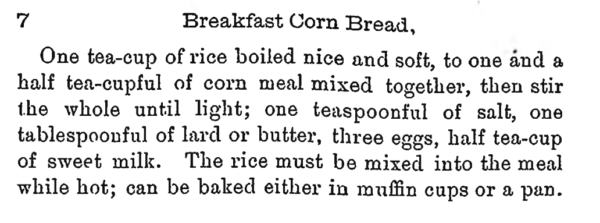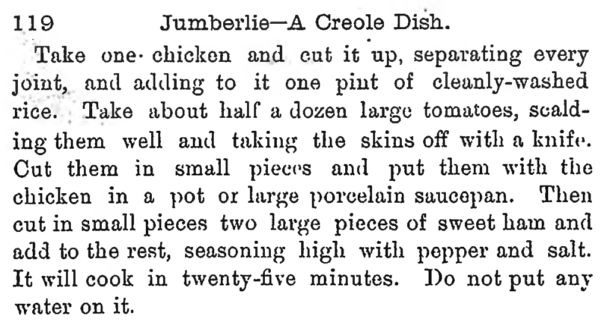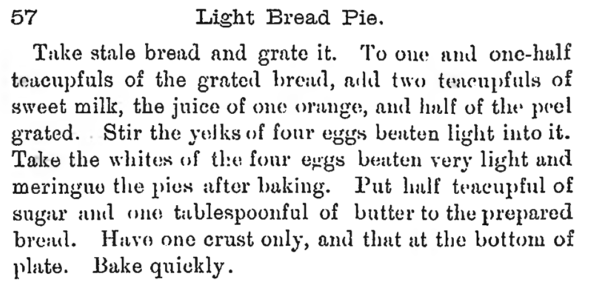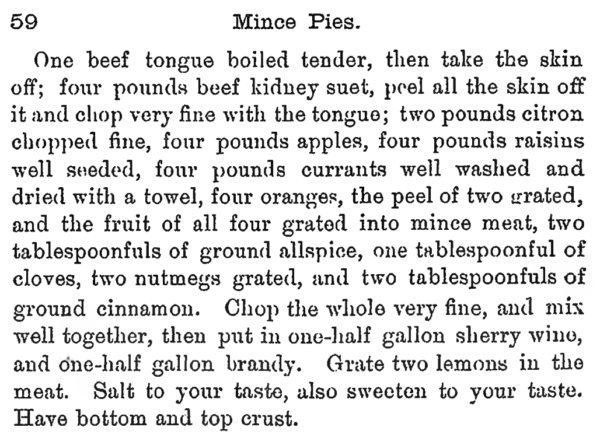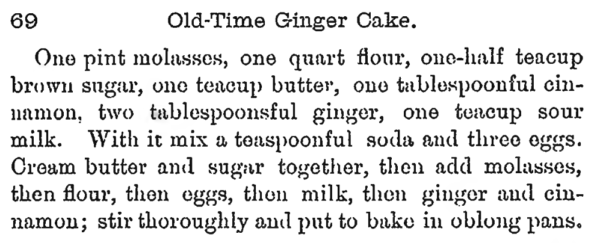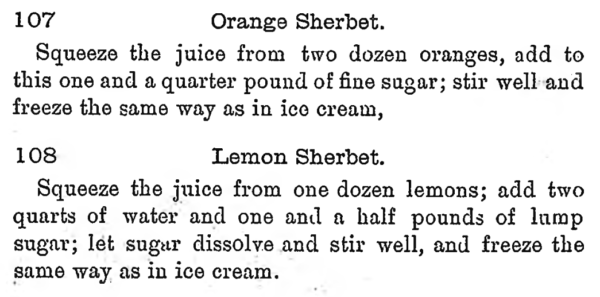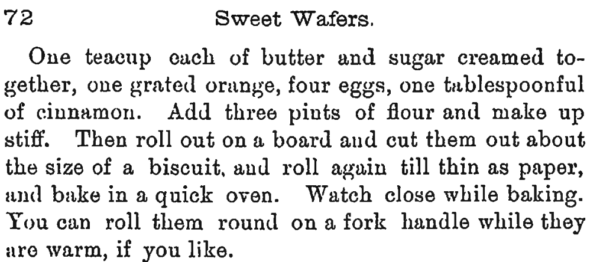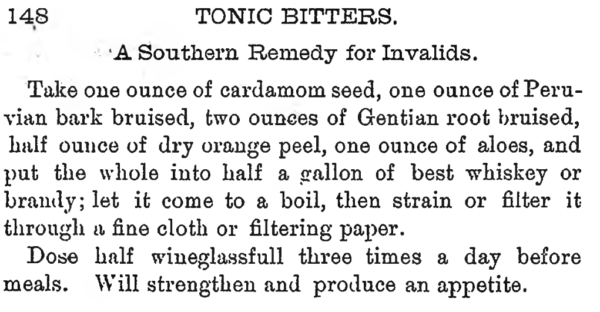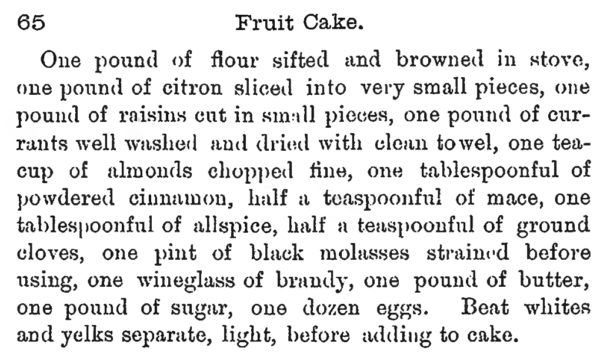Until ten years ago, Abby Fisher was known as the first African American woman to publish a cookbook in the United States. The details now known about her life give only the faintest sketch of a woman who worked her way from enslaved cook on the east coast to business owner and author on the west. Much of what we do know was unearthed by Karen Hess, southern cooking historian, who studied Abby Fisher and encouraged the reprinting of her book after a rare copy of Fisher’s book came up for auction (“What Mrs. Fisher Knows About…,” 2021). Because I am a lover of old cookbooks and have been on a hunt for all the fruitcake recipes, and of course Mrs. Fisher had one, I was elated to find Mrs. Fisher’s book online courtesy Michigan State University: https://n2t.net/ark:/85335/m5tt11. I have selected the recipes that look especially interesting to me in order share them here, but do go and check out the whole book!
Abby Fisher was born Abby Clifton to Andrew James, a white farmer of French decent, and Abbie Clifton, an African American, in South Carolina (“Abby Fisher,” 2021). During her research Hess could not find direct evidence that Abby Fisher was born into enslavement, but many have made that assumption based on Fisher’s date and location of birth (Rae, n.d.). An ad for her cookbook in the The San Francisco call from 1897 seems to support this assumption by indicating Abby Fisher was “raised in the family of the late Newton St. John of Mobile, Alabama (“An Excellent Cookery-Book,” 1897). Newton St. John was a prominent merchant and banker in Mobile prior to and after the Civil War. So, it must have been in the St. John kitchen where Abby Fisher first became a cook. Before the beginning of the Civil War, in the 1850s, Fisher met and married Alexander C. Fisher in Mobile (Rae, n.d.). After the Civil War, in 1877, the couple moved to San Francisco (“The African American Women of the Wild West,” n.d.). The 1880 census shows them on Second Street with four of their eleven eventual children. They are both listed as mixed race; Abby was working as a cook while her husband was a pickle and preserves manufacturer (“Abby Fisher,” 2021; “What Mrs. Fisher Knows About…,” 2021).
Within two years, Abby Fisher would be the pickle manufacturer in the household while her husband worked as a porter. Mrs. Abby Fisher & Company, later Mrs. Abby Fisher, Pickle Manufacturer, advertised in area newspapers and seemed to do quite well. Mrs. Fisher, entering as either an individual or representative of her business, would win awards in local fairs, including a diploma at the Sacramento State Fair in 1879 and two medals at the San Francisco Mechanics Institute Fair in 1880 (Fisher, 1881). Commenting on her submissions, fair jurors remarked “her pickles and sauces have a piquancy and flavor seldom equaled, and, when once tasted, not soon forgotten” (Mejia, 2017).

In 1881 her friends prevailed upon her to author a cookbook and took it upon themselves to transcribe the recipes from Mrs. Fisher’s dictation, since Fisher could not read or write (“Abby Fisher,” 2021). The 160 recipes in What Mrs. Fisher Knows about Old Southern Cooking, Soups, Pickles, Preserves, Etc. includes recipes and instructions for cooking for large quantities of people as well as recipes for small families. Mrs. Fisher also provides some curative recipes and tips on foods for children in a style that makes the book, in her words, “a complete instructor, so that a child can understand it and learn the art of cooking” (Fisher, 1881). Some of the recipes included, like terrapin stew and mince meat pie made with beef tongue, might not wet modern appetites, but several more recipes promise to delight any lover of southern food.
After the publication of What Mrs. Fisher Knows about Old Southern Cooking, Soups, Pickles, Preserves, Etc. by the Women’s Cooperative Printing Office in San Francisco, Mrs. Fisher moved her business from SoMa to Noe Valley on 27th Street (“Abby Fisher,” 2021). Advertisements for Mrs. Fisher’s book and business, as well as any mention of her seem to disappear after the 1906 San Francisco earthquake (“Abby Fisher,” 2021). She is supposedly buried in Cypress Lawn Memorial Park in Colma California, as listed in Wikipedia, but no death date is currently known (“Abby Fisher,” 2021).
REFERENCES
- Abby Fisher (2021) Wikipedia. https://en.wikipedia.org/wiki/Abby_Fisher
- “The African American Women of the Wild West” (n.d.) Signature Theatre. https://www.sigtheatre.org/events/201920/gp/the-african-american-women-of-the-wild-west/
- An Excellent Cookery-Book. (1897) The San Francisco call. [volume] (San Francisco [Calif.]), 16 Feb. 1897. Chronicling America: Historic American Newspapers. Lib. of Congress. <https://chroniclingamerica.loc.gov/lccn/sn85066387/1897-02-16/ed-1/seq-1/>
- Fisher, Abby. (1881) What Mrs. Fisher Knows about Old Southern Cooking, Soups, Pickles, Preserves, Etc. Women’s Co-operative printing office: Montgomery Street, San Francisco, CA. Courtesy Michigan State University: https://n2t.net/ark:/85335/m5tt11. retrieved from https://d.lib.msu.edu/fa/29/datastream/PDF_REM/View/.
- Mejia, Paula (2017) Celebrating Abby Fisher, One of the First African-American Cookbook Authors. Atlas Obscura. https://www.atlasobscura.com/articles/abby-fisher-african-american-chef-cookbook
- Rae, Alexandra (n.d.) The Formerly Enslaved Cook Who Became a Celebrity Chef in San Francisco. KQED. https://www.kqed.org/arts/13899524/cafe-ohlone-restaurant-hearst-museum-berkeley-opening
- Wagner, Tricia Martineau (2007) Abby Fisher (1832-?). Black Past. https://www.blackpast.org/african-american-history/fisher-abby-1832/
- What Mrs. Fisher Knows About Old Southern Cooking (2021) Wikipedia. https://en.wikipedia.org/wiki/What_Mrs._Fisher_Knows_About_Old_Southern_Cooking

